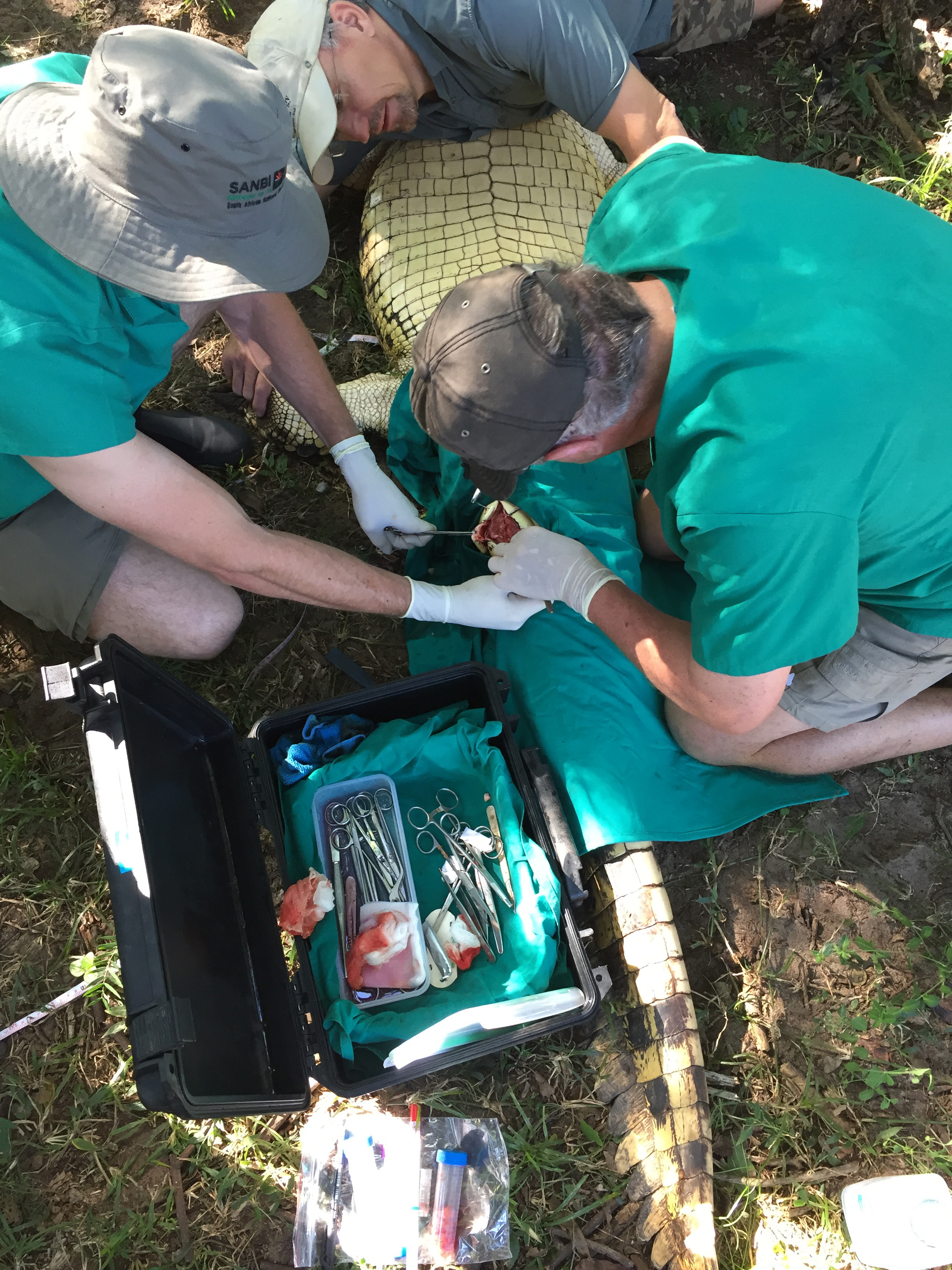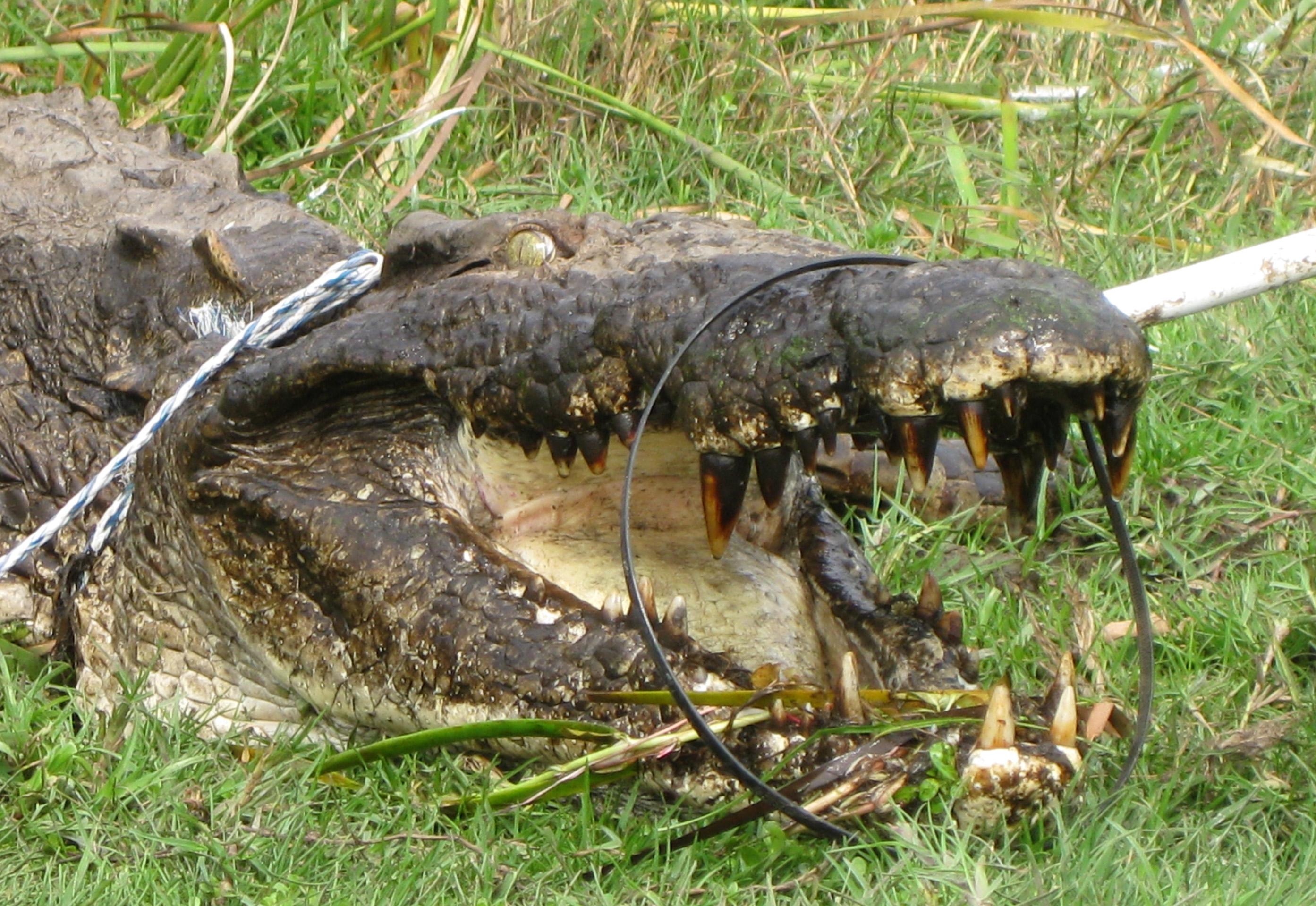Scientists are calling for all lead fishing tackle to be banned around Lake St Lucia after finding crocodiles with the highest levels of lead poisoning in the world – with some now losing their teeth or showing signs of anaemia.
St Lucia, part of the iSimangaliso Wetland Park and World Heritage Site, is home to about 1,000 crocodiles. It is one of the few remaining Nile crocodile breeding populations in the country and the largest estuarine population in Africa.
Dr Marc Humphries, lead author of a study published in the journal Chemosphere, said lead was found in the blood of every crocodile tested at the lake, with concentrations varying between 86 and 13,100 ng/mL (nanograms per millilitre). These were the highest concentrations reported for crocodiles globally.
Although most of the reptiles appeared to be in good physical condition, those with the highest level of poisoning had four to five times fewer red blood cells than “normal” crocodiles – and severe tooth decay.
“These findings suggest that anaemia and tooth loss may be clinical signs of long-term environmental exposure to lead,” said Humphries, a senior lecturer and associate professor at the University of the Witwatersrand’s School of Chemistry.
 One of the large toothless crocodiles captured by researchers at Lake St Lucia. Lead accumulates in bone and dental tissues by replacing calcium, causing deterioration in condition and eventual tooth loss. (Photo: Xander Combrink)
One of the large toothless crocodiles captured by researchers at Lake St Lucia. Lead accumulates in bone and dental tissues by replacing calcium, causing deterioration in condition and eventual tooth loss. (Photo: Xander Combrink)
 A healthy crocodile with normal teeth. (Photo: Philip Jordaan)
A healthy crocodile with normal teeth. (Photo: Philip Jordaan)
Although previously undocumented in crocodiles, alligators or caymans, these symptoms were also consistent with similar lead poisoning seen in birds and mammals elsewhere in the world.
This suggested that crocodilians may be more susceptible to the long-term toxic effects of lead than previously thought.
Call for an ‘immediate’ ban
The widespread, accidental exposure of many forms of wildlife to this toxic metal – through lead fishing weights, shotgun pellets and other lead-based ammunition – is now a major global concern because lead is an accumulative metabolic poison.
Because it poisons the brain and nervous system, lead has been banned from petrol and paint to protect human health.
Several studies have also linked exposure to neuropsychiatric conditions such as attention deficit disorder, learning disabilities and higher crime levels.
Now, Humphries and his research colleagues are calling for an immediate ban on lead fishing weights around Lake St Lucia.
 A selection of lead fishing weights (circled in red) and stones found in the stomach of a poisoned crocodile at St Lucia. The reptiles swallow stones to help grind up food in their stomachs. (Photo: Xander Combrink)
A selection of lead fishing weights (circled in red) and stones found in the stomach of a poisoned crocodile at St Lucia. The reptiles swallow stones to help grind up food in their stomachs. (Photo: Xander Combrink)
“South Africa introduced regulations eliminating lead from petrol almost two decades ago, yet we still allow it to be used in some of our most important conservation areas,” he told Our Burning Planet.
“On the surface this seems quite bizarre, but I think lack of awareness is one of the major issues. In my view, iSimangaliso should ban the use of lead immediately.”
The iSimangaliso Wetland Park Authority said it would study the report and consider the implications “as per our adaptive management approach”.
Although lead weights do not rust and have the advantage of being heavy and easy to melt and mould, Humphries says steel and tungsten are among the most popular non-toxic alternatives internationally.
Why are crocodiles getting poisoned?
One of the main reasons crocodiles are so vulnerable is because they deliberately swallow small stones and pebbles (gastroliths) to help to crunch up food in their digestive tracts.
Autopsies have revealed that some crocodiles swallow lead sinkers to serve as gastroliths, while others sometimes snatch away the fish hooked by anglers at Lake St Lucia.
 A female crocodile showing clear signs of poisoning. She had a pale, anaemic appearance, had lost most of her teeth and had black staining on the inside of her mouth. She died a few weeks after capture. Researchers found several lead fishing weights in her stomach. (Photo: Xander Combrink)
A female crocodile showing clear signs of poisoning. She had a pale, anaemic appearance, had lost most of her teeth and had black staining on the inside of her mouth. She died a few weeks after capture. Researchers found several lead fishing weights in her stomach. (Photo: Xander Combrink)
Humphries and colleagues Xander Combrink, Jan Myburgh and Robert Campbell note that several waterfowl and other grain-eating birds also swallow grit and pebbles to help digestion.
Unfortunately, lead fishing weights remain within the stomach as the small pyloric valve in a crocodile’s stomach prevents such objects from passing into the duodenum and being excreted as waste.
These pieces of lead can be retained and slowly dissolved in the crocodilian stomach over years and possibly decades. As it dissolves in stomach acids, lead is absorbed into blood, body tissues and bone.
The St Lucia crocodiles appear to be particularly vulnerable because the 70km-long estuarine lake lies on a sandy coastal plain characterised by muddy bed sediments with few stones. So it’s possible that they actively target sinkers to serve as gastroliths.
Read in Daily Maverick: “Lake St Lucia fishers – ‘We just want to fish. Why are they killing us?’”
The vast majority of the breeding population are found in the aptly named Narrows Section of Lake St Lucia.
Although crocodiles prey on a variety of mammals, including antelope, bush pig and hippopotamus, the diet of adult crocodiles at Lake St Lucia is mainly fish.
Recreational angling
Humphries believes the crocodiles have been exposed to lead poison since the start of recreational angling at Lake St Lucia in the 1930s and 1940s.
Since some of the large male crocodiles are now older than 50, they are likely to have suffered sustained exposure to lead, with large volumes building up in their bones.
Other studies show that prolonged exposure to the metal can cause significant reductions in the calcium and magnesium content of bones and teeth.
“It appears that lost teeth are not replaced, and it is possible that long-term damage to the supportive bone tissues may prevent the growth of new teeth in affected individuals. In severe cases, tooth loss could thus result in nutritional stress and eventual death.”
The latest crocodile study has also highlighted the broader, accidental harms to wildlife from hunting and fishing.
 Researchers extract samples of fat tissue from the tail of a St Lucia crocodile. (Photo: Marc Humphries)
Researchers extract samples of fat tissue from the tail of a St Lucia crocodile. (Photo: Marc Humphries)
In a separate study, English wildfowl researcher Kevin Woods has also called for stricter regulation of lead-based ammunition and fishing tackle to reduce poisoning of wildlife across the world.
He said poisoning by lead fishing weights and ammunition remains a major cause of death in a wide range of wildlife species, including the critically endangered California condor as well as Africa’s endangered white-backed vulture and Cape vulture.
In Britain, historical studies linked the death of 4,000 mute swans every year to swallowing lead fishing weights.
A voluntary campaign to reduce and phase out lead use among anglers was deemed ineffective and regulations were published in 1986 to ban the import and supply of lead weights in the sizes deemed most likely to be ingested by swans.
Since the regulation of lead fishing weights, mute swan numbers increased substantially, and restrictions on the use of lead shot in North America have been effective in reducing lead poisoning in waterfowl and predatory birds.
Back in South Africa, Humphries says: “At Lake St Lucia, the case for discontinuing the use of lead in fishing activities is clear… A shift towards non-toxic alternatives is warranted and represents the only practical way of mitigating exposure risks to wildlife.” DM168
This story first appeared in our weekly Daily Maverick 168 newspaper, which is available countrywide for R25.





 Researchers extract biological samples from the tail of a St Lucia croc.Photo: Marc Humphries
Researchers extract biological samples from the tail of a St Lucia croc.Photo: Marc Humphries